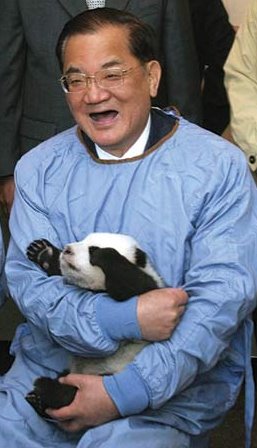The chairman of the Taiwanese organization tasked with negotiating with China . . . has a family member who was doing business with China.
These aren't the droids you're looking for . . .
[Straits Exchange Foundation Chairman Chiang Pin-kung said that although] his son’s company won a contract to represent China’s state-owned steel company, it did not need a special permit because any private company can sell the products. Besides, Chiang said, the contract expired in January and was not renewed, he said. [emphasis added}
Well, that makes it alright then . . .
The office in Shanghai is closed and he had asked his family to decrease business ties with China since he took office, he said.
Chiang said he knew very little about his son’s business and rarely asked about it. He also said that he had not used his position to secure any business deals for his son. [emphasis added]
If you say so, Chiang . . .
The [SEF] statement said [Chiang's son] had resigned from a joint venture and a foundation to avoid any conflict of interest.
Ah. So at least ONE person realized there was a potential conflict of interest here . . .
He said he hoped the media would be more supportive of him and the cross-strait negotiation team.
Farmer Bao: Is that a thief I hear in my hen house?
Answer: There ain't nobody here but us chickens!
Speaking of which, Taiwan's Chinese Nationalist Party was quick to defend that strangely-out-of-place voice emerging from the hen house:
[Mainland Affairs Council Chairwoman Lai Shin-yuan said] that Chiang was not a “policymaker” or “negotiator” in cross-strait affairs, but rather the “executor” of the council’s policy and that the Chiang issue was therefore “irrelevant.
I . . . see. Chiang is the CHAIRMAN of Taiwan's Straits Exchange Foundation — but he has absolutely NOTHING to do with the organization's policies or negotiations.
(No doubt the poor guy just comes in 3 times a week to mop up and clean the windows. So lay off him, already !)
Support from another quarter:
[KMT caucus whip Lin Yi-shih] said the [sovereignty-minded opposition party's] criticism was unreasonable as “by DPP logic, family members of a company chairman should all be barred from working for a company and depend on [the chairman] for a living.”
It may come as a surprise to nepotism-lovin' Lin, but some large corporations categorically forbid the hiring of family members. From the (American) National Conference of State Legislatures:
Nepotism in business, as in public service, brings both costs and benefits. The positive aspects of nepotism include: lower recruiting costs; less employee turnover; higher levels of loyalty, trust and satisfaction; and a sense of "ownership," according to the Wharton School of the University of Pennsylvania. Those businesses that discourage nepotism do so because it may cause problems with favoritism, discipline, fraud, confidentiality and liability. [emphasis added]
Makes sense to me. Lots of small mom-and-pop operations hire family members because the benefits of doing so outweigh the disadvantages. For larger operations, the situation may be reversed, and it's rational for corporations to adopt anti-nepotism policies.
Flash quiz: Which organization does the country of Taiwan more closely resemble? A mom-and-pop convenience store on the corner? Or a large corporation?
* Despite Lin Yi-shih's retrograde views on nepotism and conflict-of-interest, I must extend grudging admiration to the KMT for choosing a former dentist to be their party whip. No, really. I simply cannot imagine a better man for the job.
(Cue Steve Martin, from Little Shop of Horrors.)
POSTSCRIPT: The title of this post is shamelessly paraphrased from the Taipei Times' original, "SEF head regretful over son's PRC ties." Paraphrased, because it turns out that the SEF chairman is decidedly NOT regretful over his son's PRC ties. As Shaw-Chang Maa of the SEF puts it:
Chairman Chiang and his family never abused his position to secure any business for themselves, so in his mind what he feels regretful is particular media reports based on fake information which could potentially do disadvantages to future cross-strait talks.
I earlier quoted someone from the Mainland Affairs Council who swore up and down that Chiang WASN'T a "policymaker" or "negotiator". That this conflict-of-interest was "irrelevant".
Yet now, Shaw-Chang Maa comes forward and says that media silence about Chiang's conflicts-of-interest is CRUCIAL to Taiwan's economic well-being.
Maybe some folks ought to sit down and get their talking-points straight.


